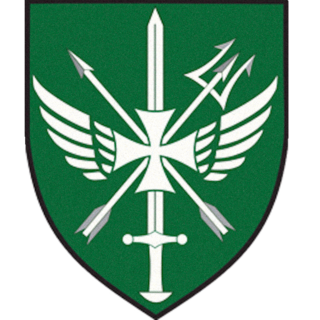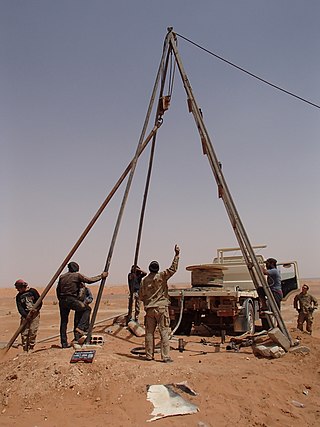Related Research Articles
L-3 MPRI was a global provider of private military contractor services with customers that included the U.S. Department of Defense, U.S. Department of State, U.S. Department of Justice, U.S. Department of Homeland Security, law enforcement agencies, foreign governments, government agencies, and commercial businesses.

The Georgia Train and Equip Program (GTEP) was an American-sponsored 18-month, $64-million program aimed at increasing the capabilities of the Georgian armed forces by training and equipping four 600-man battalions with light weapons, vehicles and communications. The program enabled the US to expedite funding for the Georgian military for Operation Enduring Freedom.

Operation Juniper Shield, formerly known as Operation Enduring Freedom – Trans Sahara (OEF-TS), is the military operation conducted by the United States and partner nations in the Saharan and Sahel regions of Africa, consisting of counterterrorism efforts and policing of arms and drug trafficking across central Africa. It is part of the Global War on Terrorism (GWOT). The other OEF mission in Africa is Operation Enduring Freedom – Horn of Africa (OEF-HOA).
CIA activities in Syria since the agency's inception in 1947 have included coup attempts and assassination plots, and in more recent years, extraordinary renditions, a paramilitary strike, and funding and military training of forces opposed to the current government.

The Syrian civil war is an ongoing multi-sided conflict in Syria involving various state-sponsored and non-state actors. In March 2011, popular discontent with the rule of Bashar al-Assad triggered large-scale protests and pro-democracy rallies across Syria, as part of the wider Arab Spring protests in the region. After months of crackdown by the government's security apparatus, various armed rebel groups such as the Free Syrian Army began forming across the country, marking the beginning of the Syrian insurgency. By mid-2012, the crisis had escalated into a full-blown civil war.

The Georgian Special Operations Forces (GSOF) are the special operations forces component of the Defense Forces of Georgia. They have been established to conduct special operations, special-and long range reconnaissance, military counter intelligence, counter terrorism, counter insurgency, amphibious and asymmetric warfare in and outside Georgia.

The Free Syrian Army is a big-tent coalition of decentralized resistance militias in the Syrian Civil War founded on 29 July 2011 by Colonel Riad al-Asaad and six officers who defected from the Syrian Armed Forces. The officers announced that the immediate priority of the Free Syrian Army was to safeguard the lives of protestors and civilians from the deadly crackdown by Bashar al-Assad's security apparatus; with the ultimate goal of accomplishing the objectives of the Syrian revolution, namely, the end to the decades-long reign of the ruling al-Assad family. In late 2011, the FSA was the main Syrian military defectors group. Initially a formal military organization at its founding, its original command structure dissipated by 2016, and the FSA identity has since been used by various Syrian opposition groups.
This is a broad timeline of the course of major events of the Syrian civil war. It only includes major territorial changes and attacks and does not include every event.

Foreign involvement in the Syrian civil war refers to political, military and operational support to parties involved in the ongoing conflict in Syria that began in March 2011, as well as active foreign involvement. Most parties involved in the war in Syria receive various types of support from foreign countries and entities based outside Syria. The ongoing conflict in Syria is widely described as a series of overlapping proxy wars between the regional and world powers, primarily between the United States and Russia as well as between Iran and Saudi Arabia.

Foreign fighters have fought on all four sides of the Syrian Civil War, as well both sides of the War in Iraq. In addition to Sunni foreign fighters, Shia fighters from several countries have joined pro-government militias in Syria, leftist militants have joined Kurdish forces, and other foreign fighters have joined jihadist organizations and private military contractors recruit globally. Estimates of the total number of foreign Sunnis who have fought for the Syrian rebels over the course of the conflict range from 5,000 to over 10,000, while foreign Shia fighters numbered around 10,000 or less in 2013 rising to between 15,000 and 25,000 in 2017.
A number of states and armed groups have involved themselves in the ongoing Syrian civil war as belligerents.

On 22 September 2014, the United States officially intervened in the Syrian civil war with the stated aim of fighting the Islamic State as part of Operation Inherent Resolve in the international war against the Islamic State. The US also supports the Syrian rebels and the Kurdish-led Syrian Democratic Forces opposed to both the Islamic State and Syrian president Bashar al-Assad.

Law enforcement in Syria is carried out by the Public Security Police, which is a force for general policing duties; internal security duties are carried out by different intelligence agencies. The Political Security Directorate is one of these agencies and is under the guidance of the Ministry of Interior of the Syrian government. The Directorate is used for covert intelligence gathering and internal security issues within Syria. Syria has been an INTERPOL member since 1953. Since the outbreak of the Syrian Civil War, much of Syria has been outside the control of the Syrian government. Currently, the Asayish are responsible for policing in the Autonomous Administration of North and East Syria, the Turkish-backed Free Syrian Police in areas under the Turkish occupation of northern Syria, and various Syrian opposition groups around Idlib

The Syrian Train and Equip Program is a United States-led military operation launched in 2014 that identified and trained selected Syrian opposition forces inside Syria as well as in Turkey and other US-allied states who would then return to Syria to fight the Islamic State of Iraq and the Levant. The program reportedly cost the US $500 million. It is a covert program, run by U.S. special operations forces, separate from Timber Sycamore, the parallel covert program run by the Central Intelligence Agency (CIA). As of July 2015, only a group of 54 trained and equipped fighters had been reported to have been deployed, which was quickly routed by al-Nusra, and a further 75 were reported in September 2015.

The Syrian Democratic Forces (SDF) is a coalition formed by ethnic militias and rebel groups, and serves as the official military wing of the Autonomous Administration of North and East Syria (AANES). The SDF is allied to and supplied by the United States–led CJTF–OIR international alliance. Founded in 10 October 2015, the SDF claims that its mission is fighting to create a secular, democratic and federalised Syria. The SDF is opposed by Turkey, who claims the group has direct links to the PKK, which it recognizes as a terrorist group.
Saudi Arabia's involvement in the Syrian Civil War involved the large-scale supply of weapons and ammunition to various rebel groups in Syria during the Syrian Civil War.
Gulmurod Salimovich Khalimov (1975–2017) was a Tajik and Islamist military commander. He was a lieutenant-colonel and commander of the police special forces of the Interior Ministry of Tajikistan until 2015, when he defected to the Islamic State. In September 2016, he was reported to have been appointed as the minister of war of IS in place of Abu Omar al-Shishani; his appointment had not been announced by IS for fears that he might be targeted in airstrikes by the anti-IS coalition. On 8 September 2017, Khalimov was allegedly killed during a Russian airstrike near Deir ez-Zor, Syria. However, the Tajik government, United Nations, and the United States believed that he was still alive by 2019, though his exact fate remained disputed. By 2020, Islamist militants claimed he had died at some point; this source was considered unreliable by the Tajik government. Regardless, the United States had removed Khalimov from their Rewards for Justice Program by 2021.

Timber Sycamore was a classified weapons supply and training program run by the United States Central Intelligence Agency (CIA) and supported by some Arab intelligence services, including Saudi intelligence. The aim of the programme was to remove Syrian president Bashar al-Assad from power. Launched in 2012 or 2013, it supplied money, weaponry and training to Syrian opposition militias fighting al-Assad's forces in the Syrian civil war. According to US officials, the program was run by the CIA's Special Activities Division and has trained thousands of rebels. President Barack Obama secretly authorized the CIA to begin arming Syria's embattled rebels in 2013. The program became public knowledge in mid-2016.
Foreign support in the Bosnian War included the funding, training or military support by foreign states and organizations outside Yugoslavia to any of the belligerents in the Bosnian War (1992–95).

Foreign fighters in the Syrian civil war have come to Syria and joined all four sides in the war. In addition to Sunni foreign fighters arriving to defend the Islamic State of Iraq and the Levant or join the Syrian rebels, Shia fighters from several countries have joined pro-government militias in Syria, and leftists have become foreign fighters in the Syrian Democratic Forces.
References
- ↑ The Bosnian Train and Equip Program: A Lesson in Interagency Integration of Hard and Soft Power By Christopher J. Lamb, with Sarah Arkin and Sally Scudder | Strategic Perspectives 15 | March 01, 2014 http://inss.ndu.edu/Media/News/Article/693534/the-bosnian-train-and-equip-program-a-lesson-in-interagency-integration-of-hard/
- ↑ "Helping Georgia?". Institute for the Study of Conflict, Ideology and Policy. Boston University. March–April 2002. Retrieved 2007-02-14.
- ↑ State.gov Georgia Train and Equip Program (GTEP) February 1, 2003 https://2001-2009.state.gov/r/pa/ei/pix/b/eur/18737.htm
- ↑ David Ignatius (20 August 2015). "Lessons from the Bay of Pigs in the Syrian 'Division 30' debacle". Washington Post. Retrieved 26 September 2015.
- ↑ Jim Miklaszewski (16 September 2015). "Small number of U.S.-trained Syrian rebels still fighting". NBC News. Retrieved 26 September 2015.
- ↑ "Rebel training program in Syria yields '4 or 5' fighters". MilitaryTimes. 16 September 2015. Retrieved 26 September 2015.